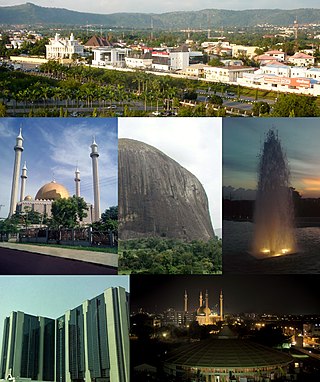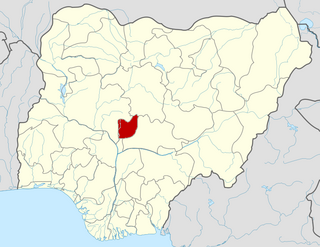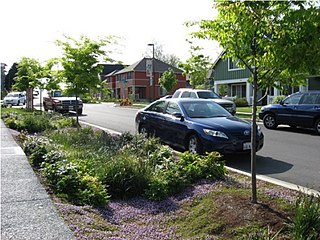Related Research Articles

Abuja is the capital and eighth most populous city of Nigeria. Situated at the centre of the country within the Federal Capital Territory (FCT), it is a planned city built mainly in the 1980s based on a master plan by International Planning Associates (IPA), a consortium of three American planning and architecture firms made up of Wallace, Roberts, McHarg & Todd as the lead, Archi systems International, and Planning Research Corporation. The Central Business District of Abuja was designed by Japanese architect Kenzo Tange. It replaced Lagos, the country's most populous city, as the capital on 12 December 1991.

Stormwater, also written storm water, is water that originates from precipitation (storm), including heavy rain and meltwater from hail and snow. Stormwater can soak into the soil (infiltrate) and become groundwater, be stored on depressed land surface in ponds and puddles, evaporate back into the atmosphere, or contribute to surface runoff. Most runoff is conveyed directly as surface water to nearby streams, rivers or other large water bodies without treatment.

Benue River, previously known as the Chadda River or Tchadda, is the major tributary of the Niger River, with a length of approximately 1,400 kilometres (870 mi) long and almost entirely navigable during the summer months. The size of its catchment basin is 319,000 km2 (123,000 sq mi). As a result, it is an important transportation route in the regions through which it flows. The name Benue comes from Binuwe meaning 'Mother of Waters’ in the Batta language.

The Federal Capital Territory (FCT) is a federal territory in central Nigeria. Abuja, the capital city of Nigeria, is located in this territory. The FCT was formed in 1976 from parts of the states of old Kaduna, Kwara, Niger, and Plateau states, with the bulk of land mass carved out of Niger state. The Federal Capital Territory is within the North Central region of the country. Unlike other states of Nigeria, which are headed by elected Governors, it is administered by the Federal Capital Territory Administration, headed by a minister, who is appointed by the president.

Rain gardens, also called bioretention facilities, are one of a variety of practices designed to increase rain runoff reabsorption by the soil. They can also be used to treat polluted stormwater runoff. Rain gardens are designed landscape sites that reduce the flow rate, total quantity, and pollutant load of runoff from impervious urban areas like roofs, driveways, walkways, parking lots, and compacted lawn areas. Rain gardens rely on plants and natural or engineered soil medium to retain stormwater and increase the lag time of infiltration, while remediating and filtering pollutants carried by urban runoff. Rain gardens provide a method to reuse and optimize any rain that falls, reducing or avoiding the need for additional irrigation. A benefit of planting rain gardens is the consequential decrease in ambient air and water temperature, a mitigation that is especially effective in urban areas containing an abundance of impervious surfaces that absorb heat in a phenomenon known as the heat-island effect.
Environmental issues in Pakistan include air pollution, water pollution, noise pollution, climate change, pesticide misuse, soil erosion, natural disasters, desertification and flooding. According to the 2020 edition of the environmental performance index (EPI) ranking released by Yale Center for Environmental Law & Policy, Pakistan ranks 142 with an EPI score of 33.1, an increase of 6.1 over a 10-year period. It ranked 180 in terms of air quality. The climatic changes and global warming are the most alarming issues risking millions of lives across the country. The major reasons of these environmental issues are carbon emissions, population explosion, and deforestation.

Surface runoff is the unconfined flow of water over the ground surface, in contrast to channel runoff. It occurs when excess rainwater, stormwater, meltwater, or other sources, can no longer sufficiently rapidly infiltrate in the soil. This can occur when the soil is saturated by water to its full capacity, and the rain arrives more quickly than the soil can absorb it. Surface runoff often occurs because impervious areas do not allow water to soak into the ground. Furthermore, runoff can occur either through natural or human-made processes.

Sustainable drainage systems are a collection of water management practices that aim to align modern drainage systems with natural water processes and are part of a larger green infrastructure strategy. SuDS efforts make urban drainage systems more compatible with components of the natural water cycle such as storm surge overflows, soil percolation, and bio-filtration. These efforts hope to mitigate the effect human development has had or may have on the natural water cycle, particularly surface runoff and water pollution trends.

Green infrastructure or blue-green infrastructure refers to a network that provides the “ingredients” for solving urban and climatic challenges by building with nature. The main components of this approach include stormwater management, climate adaptation, the reduction of heat stress, increasing biodiversity, food production, better air quality, sustainable energy production, clean water, and healthy soils, as well as more anthropocentric functions, such as increased quality of life through recreation and the provision of shade and shelter in and around towns and cities. Green infrastructure also serves to provide an ecological framework for social, economic, and environmental health of the surroundings. More recently scholars and activists have also called for green infrastructure that promotes social inclusion and equality rather than reinforcing pre-existing structures of unequal access to nature-based services.

In Nigeria, there has been a major progress in the improvement of health since 1950. Although lower respiratory infections, neonatal disorders and HIV/AIDS have ranked the topmost causes of deaths in Nigeria, in the case of other diseases such as monkeypox, polio, malaria and tuberculosis, progress has been achieved. Among other threats to health are malnutrition, pollution and road traffic accidents. In 2020, Nigeria had the highest number of cases of COVID-19 in Africa.

There are multiple environmental issues in India. Air pollution, water pollution, garbage, domestically prohibited goods and pollution of the natural environment are all challenges for India. Nature is also causing some drastic effects on India. The situation was worse between 1947 through 1995. According to data collected and environmental assessments studied by World Bank experts, between 1995 through 2010, India has made some of the fastest progress in addressing its environmental issues and improving its environmental quality in the world. However, Pollution still remains a major challenge and opportunity for the country.

Urban runoff is surface runoff of rainwater, landscape irrigation, and car washing created by urbanization. Impervious surfaces are constructed during land development. During rain, storms, and other precipitation events, these surfaces, along with rooftops, carry polluted stormwater to storm drains, instead of allowing the water to percolate through soil. This causes lowering of the water table and flooding since the amount of water that remains on the surface is greater. Most municipal storm sewer systems discharge untreated stormwater to streams, rivers, and bays. This excess water can also make its way into people's properties through basement backups and seepage through building wall and floors.
The Federal Capital Territory Administration (FCTA) is a Nigerian ministry that administers the Federal Capital Territory of Nigeria. It is headed by a Minister appointed by the President, assisted by a Permanent Secretary, who is a career civil servant.
Bala Abdulkadir Mohammed is Nigerian politician who has served as governor of Bauchi State since 2019. Prior to becoming governor of Bauchi State, he was minister of the Federal Capital Territory from 2010 to 2015, and Senator for Bauchi South from 2007 to 2010. He is a ranking member of the opposition Peoples Democratic Party.

Agbogbloshie is a nickname of a commercial district on the Korle Lagoon of the Odaw River, near the center of Accra, Ghana's capital city in the Greater Accra region. Near the slum called "Old Fadama", the Agbogbloshie site became known as a destination for externally generated automobile and electronic scrap collected from mostly the western world. It was a center of a legal and illegal exportation network for the environmental dumping of electronic waste (e-waste) from industrialized nations. The Basel Action Network, a small NGO based in Seattle, has referred to Agbogbloshie as a "digital dumping ground", where they allege millions of tons of e-waste are processed each year.
Philips Tanimu Aduda is a Nigerian politician. He served two terms in the Nigerian House of Representatives between 2003 and 2011, and was elected to the Senate for the Abuja Federal Capital Territory in the 9 April 2011 elections, running on the People's Democratic Party (PDP) ticket.

Responsibility of water supply in Nigeria is shared between three (3) levels of government – federal, state and local. The federal government is in charge of water resources management; state governments have the primary responsibility for urban water supply; and local governments together with communities are responsible for rural water supply. The responsibility for sanitation is not clearly defined.
Ajah is a town in Eti-Osa local government area in Lagos State in Nigeria. It encompasses Addo, Langbasa, Badore, Ajiwe, VGC, etc. Ajah has been linked to shootings and clashes which resulted in death and loss of property.
Natural disasters in Nigeria are mainly related to the climate of Nigeria, which has been reported to cause loss of lives and properties. A natural disaster might be caused by flooding, landslides, and insect infestation, among others. To be classified as a disaster, there is needs to be a profound environmental effect or human loss which must lead to financial loss. This occurrence has become an issue of concern, threatening large populations living in diverse environments in recent years.
Rainwater management is a series of countermeasures to reduce runoff volume and improve water quality by replicating the natural hydrology and water balance of a site, with consideration of rainwater harvesting, urban flood management and rainwater runoff pollution control.
References
- 1 2 3 Igibah, E.C.; Agashua, L. O.; Sadiq, A. A. (December 2019). "Correlated respiratory indicators of Household waste burning practices in Lugbe – Abuja, Nigeria". Journal of Physics: Conference Series. 1378 (4): 042012. Bibcode:2019JPhCS1378d2012I. doi: 10.1088/1742-6596/1378/4/042012 . ISSN 1742-6588. S2CID 213779622.
- ↑ "Three Killed As Flood Hits Estate In Abuja". Channels Television. Retrieved 2021-10-02.
- ↑ OYOYO, IGHO (2021-09-26). "Trademore Disaster: A Cue To Avert Future Flooding Within The FCT". Leadership News - Nigeria News, Breaking News, Politics and more. Retrieved 2021-10-02.
- ↑ "Ongoing demolition in Abuja". Punch Newspapers. 2021-09-15. Retrieved 2021-10-02.
- ↑ Oluyori, N. R.; Alhassan, M. M. (2020-04-07). "Assessment of urban storm runoff water quality in Lugbe, Abuja Municipal Area Council, FCT, Nigeria". Journal of Research in Forestry, Wildlife and Environment. 12 (1): 138–147. ISSN 2141-1778.
- ↑ "Quality Assessment of Surface and Groundwater Sources in Lugbe, Abuja, North-Central Nigeria". International Institute for Science, Technology and Education (IISTE). 2015.
{{cite journal}}: Cite journal requires|journal=(help)